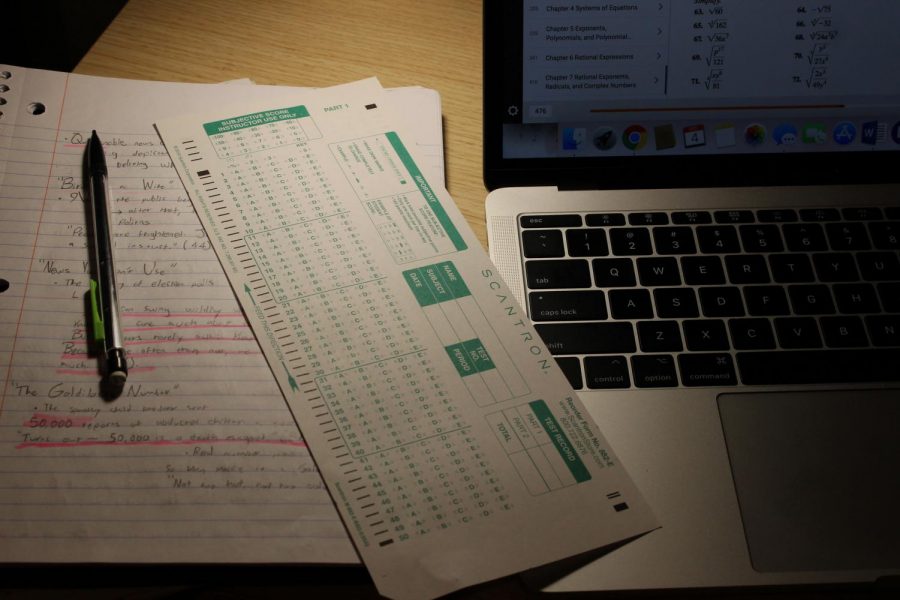Tips on making it through finals week
Another tip is to make sure you have all of the scantrons and blue books before you go to your final exam. (Emma Hall/The Inquirer)
December 5, 2018
As final exams begin to creep upon students, it’s easy to lose sight of essential needs and mental health. Regardless of what type of student you are, you always should look out for your well-being. While this could be seen as common sense, students often forget this. It is easy to become absorbed in our studies, especially if it’s a subject of difficulty. Here are some tips to make your studying experience less pain-staking and more centered around your well being.
Take breaks during study periods
It’s normal to feel overwhelmed if you study for significantly long periods of time. Try to avoid pulling a dreaded all-nighter as well. According to Psychology Today, your brain codes information during the Rapid Eye Movement stage in your sleep cycle, storing information that you have taken in during the day. It’s even more important to get a healthy amount of sleep, not just a quick two hour nap. Your sleep cycle has four primary stages, but when you reach REM, your mind and body is able to feel relaxed and rested. The National Sleep Foundation states that young adults and adults from ages 18-64 should sleep seven to nine hours.
Schedule how and when you study
Try organizing what points in the day you will study and how much time you need to study for specific subjects. If you’re having trouble remembering those tough biology terms, spend extra time covering those subjects than ones you will have an ease with. Daniel Levitin of McGill University in Quebec, a renowned professor of psychology and behavioral neuroscience told The Washington Post that multi-tasking overloads your brain. This makes information more difficult to memorize, retain, and understand. Take some time out of your day to do something you love or practice some simple self-care as well, overall it increases morale. This can range from taking yourself out for lunch, listening to your favorite album, meditating, or just simply taking a hot shower and letting your nerves calm down. Stepping away from your studies to take a breather will bring you back to your studies with a clear mind.
If you are struggling with remembering material, don’t hesitate to ask questions. As an introvert with chronic anxiety, I understand how difficult it is to speak up. However, I can guarantee from personal experience, that avoiding to ask questions will give you more troubles in your studies. If you have difficulty speaking to your professor and feel more comfortable with classmates, don’t hesitate to ask them questions either.
Communicate with your professor and peers
If you are struggling with remembering material, don’t hesitate to ask questions. As an introvert with chronic anxiety, I understand how difficult it is to speak up. However, I can guarantee from personal experience, that avoiding to ask questions will give you more troubles in your studies. If you have trouble speaking to your professor and feel more comfortable with classmates, don’t hesitate to ask them questions either. It is also strongly recommended that you communicate with your friends and peers who share classes with you when discussing the material. Schedule a study group session, quiz one another, and remember to be supportive. Take advantage of every opportunity that could help you, even if it’s group tutoring or studying sessions. Don’t ever feel ashamed for reaching out for assistance. Asking for help doesn’t make you stupid.
Create effective studying strategies around how your brain takes in memory
When I took a year long psychology course last year, I learned a significant amount of information about how exactly memory works. It helps to understand how we fully retain information when figuring out studying strategies. When we retain information, our brain processes it in three stages: encoding, storage, and retrieval. Encoding is when your brain is in the process of putting information into memory. Storage is self-explanatory, is is the exact stage in which your brain stores the information. The final stage, retrieval, is when your brain pulls out information into consciousness and begins to remember it.
A great way to enact the retrieval stage is to emulate your classroom setting. You actually will have a stronger likelihood of remembering material if you study in an environment that emulates how your class is. Take advantage of this if you have the chance to come to your class early for studying time. This is an example of context dependence, a psychological term for when one’s experiences retrieval cues that are triggered through being in a similar, if not identical environment. It also helps to study at specific times alongside studying in similar environments. If you have your English class at 12:45 p.m. on Tuesday and Thursdays but have that time slot open on Mondays and Wednesdays, take that time to study for that class. If you simulate the mood you are during that time of the day, your chances of remembering information will increase. This is known as state dependence and refers to when your brain retrieves cues that are triggered through one’s mood or state of mind.
Accept failure
Finally, the most important and rather depressing tip, accept you might fail. But failure is perfectly okay. If you’ve known deep down that there is nothing you can do to pass your exam, then accept failure. Every failure is just as important as every success because as individuals we gain character from each experience. However, it is essential that you take something away from your failure. Think about what you can do next time to achieve a more positive outcome, but understand that failure is a part of life. Failing does not make you less valid of a person or as a student, even if it costs you $200 in tuition. Have your failure drive you to success. Pick yourself up and keep going. Remember that if you’re dedicated, determined, and hardworking, nothing can stop you.
While the semester will soon come to an end in these next two weeks, it’s important that as students we make the best of it. So, Godspeed to all of you hard working students and remember to take care of yourselves. At the end of the day, it’s important to remember to be kind and treat yourself. Being positive and proactive truly makes a difference.












































































